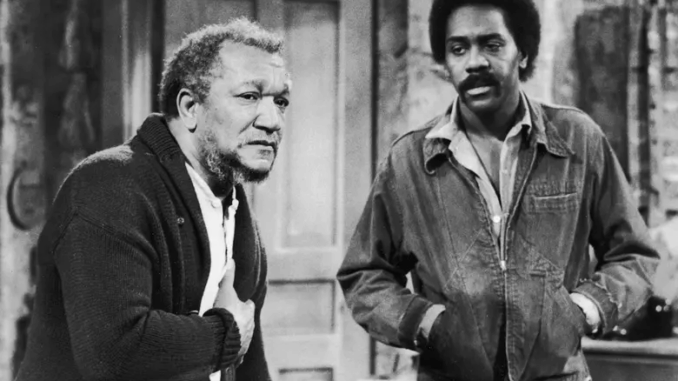
The Unlikely Origin Story of Clean Slate
The world of television is full of unexpected twists and turns, but few are as compelling as the origin story of the sitcom Clean Slate. The series, which stars comedian George Wallace and Emmy-winning actress Laverne Cox, began not as a groundbreaking concept about a father reconciling with his trans daughter, but as a simple pitch for a reboot of the classic 1970s sitcom Sanford and Son. The journey from that initial idea to a show that carries on the legacy of television icon Norman Lear is a fascinating tale of creative evolution.
The story starts with stand-up comedian George Wallace, a longtime friend and collaborator of Lear’s. Wallace had an idea to revive the beloved classic Sanford and Son, a show created by Lear that followed the cantankerous Fred Sanford and his long-suffering son, Lamont. The show’s premise of a junk dealer and his son’s squabbles was a goldmine for comedy, and Wallace saw an opportunity to bring it back for a new generation. He and his writing partner, Dan Ewen, took the idea to the legendary producer.
Norman Lear’s Wisdom: “Get a Twist and Come Back”
Norman Lear, the creative force behind some of television’s most iconic and socially conscious shows like All in the Family and The Jeffersons, had a piece of advice that would change everything. He looked at Wallace and Ewen and told them, “Are you kidding? You can’t do that show. Get a twist and come back.” Lear understood that a straightforward reboot would be a disservice to the original. He knew that the magic of his shows lay not just in their humor but in their ability to use comedy to explore complex and often uncomfortable social issues. A modern-day Sanford and Son would need more than just a new cast; it would need a fresh perspective, a contemporary issue to grapple with.
Inspired by Lear’s challenge, Wallace and Ewen began to brainstorm. Ewen had the idea to change the son to a daughter. This small shift led to a bigger, more profound one: what if the daughter was a transgender woman? The concept immediately clicked. The father-daughter dynamic would be a new take on the classic father-son relationship, and the added layer of a trans daughter returning after 17 years would provide the kind of rich, dramatic, and comedic tension that Lear was famous for.
From Concept to Reality: A New Era of Lear-Style Comedy
With this new “twist,” the project took on a life of its own. They brought on Laverne Cox, a trailblazer and a powerful voice for the transgender community, to play the role of the daughter, Desiree. Cox’s involvement elevated the project, bringing her own lived experience and perspective to the show. The pilot was written in just four days, and the new trio—Wallace, Ewen, and Cox—returned to Lear with their refined pitch.
Lear’s reaction was exactly what they had hoped for. According to Cox, he was deeply moved by the concept, saying, “I’ve learned more about life that I should have known but didn’t know.” He saw the potential for the show to be a new kind of “trojan horse” comedy, much like his past work. The humor would be the way in, but the show would ultimately be about acceptance, family, and unconditional love.
The show, now titled Clean Slate, found a home on Prime Video. It was a testament to the enduring power of Lear’s vision and his faith in using comedy to build bridges and foster understanding. The series, which premiered shortly after Lear’s death, became one of his last projects, a final act of his legacy as a producer who was never afraid to push boundaries.
Carrying on the Legacy: Humor with a Human Touch
What makes Clean Slate so special is how it embodies the spirit of Norman Lear’s work. It leads with humor, using the classic sitcom format to explore a deeply personal and often politically charged topic. George Wallace’s character, Harry, is a lovable but old-school car wash owner who fumbles with pronouns and struggles to understand his daughter’s new reality. But he is never hateful. He is simply uninformed, and his journey is one of learning and love, not bigotry.
This is the very essence of Lear’s genius. His shows never pointed a finger or delivered a preachy message. Instead, they showed flawed, relatable human beings grappling with the complexities of a changing world. In All in the Family, Archie Bunker’s narrow-minded views were not a final statement but a starting point for dialogue. In Clean Slate, Harry’s awkwardness and occasional missteps are a source of comedy, but the heart of the show is his unconditional love for his daughter.
The show is also a powerful reminder of the importance of representation. For decades, the transgender community has been underrepresented and often misrepresented in media. Clean Slate, with Laverne Cox in a leading role, offers a humanizing and authentic portrayal that goes beyond stereotypes. It is a show that, like Sanford and Son before it, shows a Black family at the center of a story, a family whose lives and struggles are both unique and universal.
Ultimately, the story of Clean Slate is a beautiful full-circle moment for television. It shows how a simple idea—a reboot of a classic—can be transformed by the guidance of a master into something new, relevant, and groundbreaking. It is a testament to Norman Lear’s belief that comedy is at its best when it’s fearless, honest, and rooted in the messy, wonderful reality of human relationships. And it all started with a simple suggestion: “Get a twist and come back.”